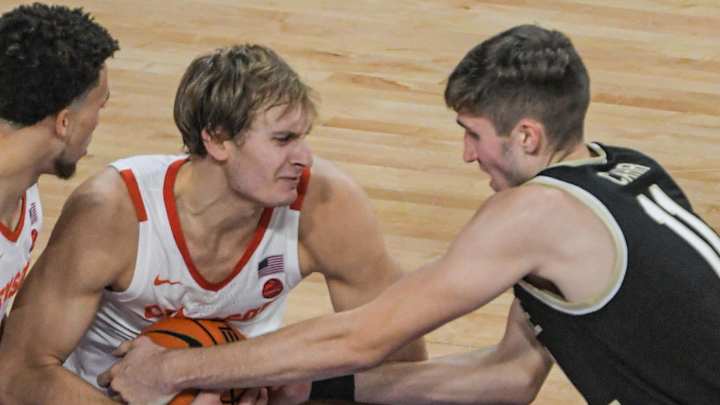Takeaways from Wake Forest's 77-57 Loss to Clemson

After leading by seven at the half, Wake Forest was handled easily after the break in a 77-57 loss to Clemson.
Read below for our takeaways from the game.
This week’s travel caught up to Wake Forest
This was Wake Forest’s schedule this past week:
Saturday- vs Hampton
Monday- Travel to Wisconsin
Tuesday- at Wisconsin, fly back to Winston-Salem late night
Thursday- Travel to Clemson
Friday- at Clemson
That makes for a very busy, tiring few days of travel. In the first half, Wake Forest seemed to be like their normal selves. They hit 43% of their field goals and 40% of their threes, while forcing 10 Clemson turnovers.
Wake Forest also went on a 13-6 run in the final seven minutes. As such, they entered the locker room with a seven-point halftime lead, and looked close to breaking the game open.
But, in the second half, it looked like the week caught up to the Deacs. Defensively, they struggled to keep up with Clemson’s fast-paced ball movement, and they made several errors in judgment that led to open threes. On offense, Wake Forest took ill-advised shots early in possessions instead of using the clock and finding a better option — they only made 24% of their shots.
After the game, Wake Forest head coach Steve Forbes denied that fatigue was a factor, but Clemson’s Brad Brownell thought the Tigers had the edge because of the Deacs’ travel.
“That's a tough turnaround for them,” Brownell said. “They had a tough travel deal. [The game] was hard for us, too, and we didn't have to travel. So I know it was hard on them. There's probably a little bit of an advantage there for us.”
The Deacs were outmatched by Clemson’s physicality
In the first half, Wake Forest played solid defense. They repeatedly stood up Clemson on the drive, forcing them to take tough shots, and stymied their bigs in one-on-ones under the basket. Wake’s bigs were making things difficult for Clemson’s PJ Hall, fighting hard for position in the post and denying entry passes.
The same could not be said for the second half. On both sides of the court, the Deacs were manhandled in the paint — they were outrebounded 21-9. The bigs did not perform well against their matchups — forwards PJ Hall and Hunter Tyson led the team with 21 and 15 points respectively, and combined for 18 boards. The guards struggled on the drive, going six of 16 on layups.
“I thought they were the tougher, more physical team,” Forbes said. “They completely whipped us in the second half.”
The guards underperformed
After scoring 32 points against Wisconsin, the ACC's leading scorer Tyree Appleby had a tough game at Littlejohn Coliseum. He shot 3/13 from the floor and only scored eight points. His last recorded stat of the game was a technical foul for arguing with the referee in the final minutes. He was promptly taken off the floor by Forbes.
In his second game back from injury, Daivien Williamson was likely Wake Forest’s best guard of the night. He hit five of his 11 shots, and converted two three-pointers. But, down the stretch, several of those misses were air-balls or shots he should not have taken.
Cameron Hildreth, who has earned a starting role with tenacious defense and consistent scoring, shot 30% from the field and added two turnovers. On Friday night, he was often too aggressive looking for his own offense, calling his own number from the post or from long range early on in possessions.
Lastly, Jao Ituka struggled the most out of the guards. In a four-minute stretch, he took one shot — a miss — and registered a foul. He also turned the ball over four times, accounting for more than half of Wake Forest’s first half turnovers. After those four minutes, Forbes took him out of the game, and he did not play again.
“I thought our guards played really poorly,” Forbes said. “All of them, not just on offense, but defensively.”
The guard play will be the engine of this team most nights, so the Demon Deacons will struggle to win games when they don’t play well.
Follow @DeaconsDaily on Twitter and Instagram for more Wake Forest content
